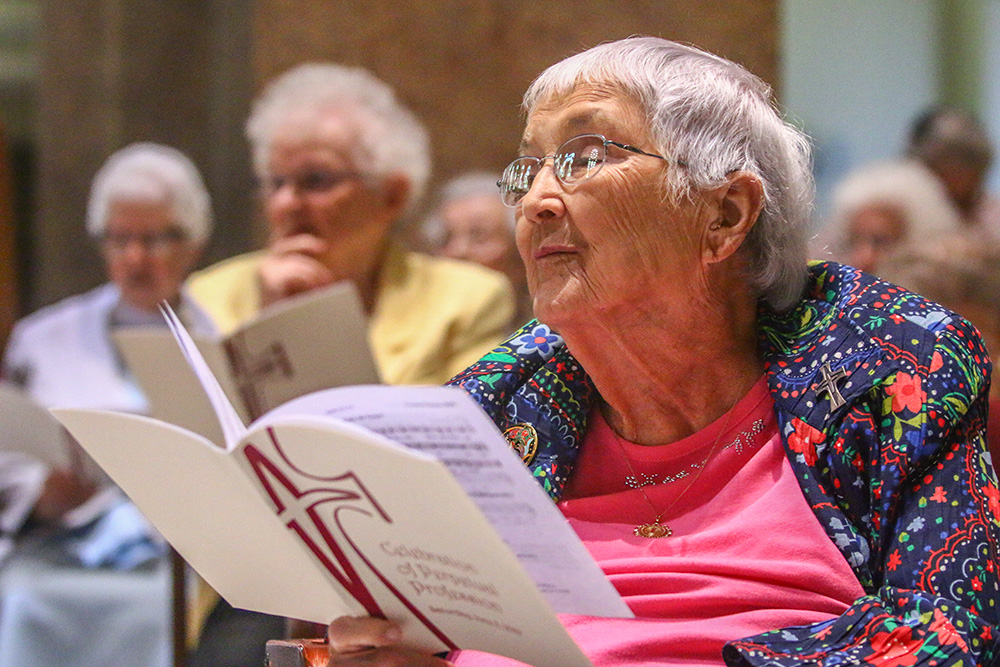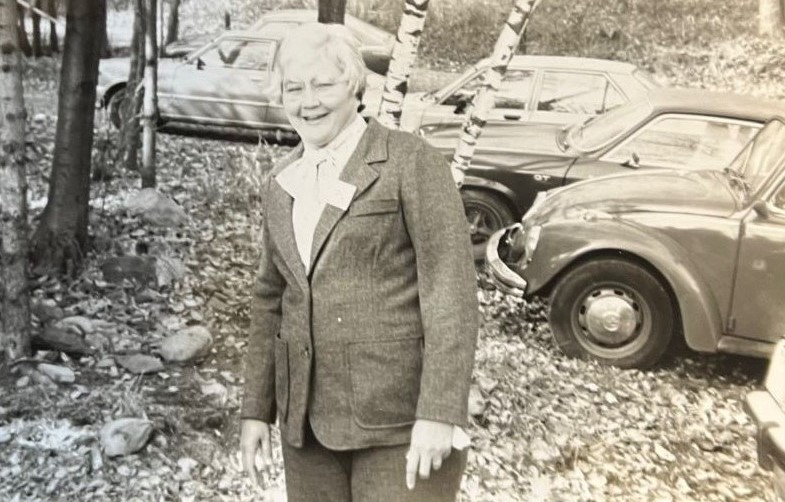
Mercy Sr. Theresa Kane in June 2019 during a liturgy when four Mercy sisters professed their perpetual vows. Kane, who fought for decades for the equality of women in the Catholic Church — famously publicly challenging the pope on the issue in 1979 — died Aug. 22 at age 87. (Courtesy of the Sisters of Mercy of the Americas)
Editor's note: Reproduced below is the transcript of the homily given by theologian Charles E. Curran at the funeral of Mercy Sr. Theresa Kane, held Sept. 3 at Church of the Transfiguration in Tarrytown, New York. The homily is published with permission.
Almost 20 years ago, many who are here today gathered to celebrate the 50th anniversary of Theresa Kane's commitment as a Sister of Mercy. Today we are here for her funeral. We gather now for four purposes — first, to give thanks for her life; second, to mourn her death; third, to celebrate her hope; fourth, to commit ourselves to carry on the magnificent work that she did.
First, we gather to give thanks for what she did in her life. All present here today are aware of her many accomplishments. This morning, I want to concentrate on two — the first is the prophetic voice to work for reform in the church.
The primary illustration here is the greeting she gave to Pope John Paul II at the National Shrine of the Immaculate Conception in Washington, D.C. in 1979. She greeted the pope before he spoke to more than 2,000 religious women gathered there. In that short greeting, she urged the pope to provide the possibility of including women in all ministries of our church. "I urge you, your Holiness, to be open to and respond to the voices coming from the women of this country who are desirous of serving in and through the church as fully participating members." Her prophetic utterance will never be forgotten.
In the late '70s, the general administration team of the Sisters of Mercy headed by Theresa Kane basically accepted a report from a committee of Sisters of Mercy involved in health care calling for their many Mercy hospitals in the United States to provide tubal ligations necessary to avoid unjust injuries to women. The Vatican and the U.S. bishops ordered them to withdraw this document since it directly opposed existing church teaching. There obviously would be very serious consequences for the Sisters of Mercy if they refused to change their position. The administrative team under the leadership of Theresa Kane, despite their personal disagreements, agreed to withdraw their letter to the community's hospitals. This was not an easy decision for them to make.
Theresa continued to work for the reform of the church even if she often was not successful. She did not leave the church; she did not give into anger. Her deep spirituality gave her the strength to carry on her mission for reform in the church despite all the problems, difficulties, and sufferings it had caused her. Theresa Kane remains an exemplar and model for all who work for reform in our pilgrim church.
Advertisement
Her second outstanding contribution was to live out her commitment as a Sister of Mercy in showing mercy to the poor and the needy. Our first reading reminds us of the vision of the foundress of the Sisters of Mercy to love everyone who needs love and to care for everyone who needs care. Our Gospel reading of the Magnificat proclaims that God's mercy is from age to age deposing the mighty from their thrones and raising up the lowly.
Two illustrations serve to show her commitment to the poor and the needy. Soon after she left all the leadership responsibilities she had carried for many years in New York and in Washington, she volunteered to live and work in the very small community of Mercy Sisters in Tupper Lake, New York. In the census population in 2023 there were 2.8 thousand people living in this small, isolated Adirondack community; in fact, the small community of Mercy Sisters is no longer there. Here in this small community in upstate New York, Theresa lived out what it means to be a Sister of Mercy.
Her last nine years were involved with teaching at Mercy College (now University) in Dobbs Ferry, New York. For these nine years she traveled by car to satellite campuses in the Bronx teaching Hispanic students who were usually the first in their families to ever go to college. Theresa was there to help these people in need. Her students had no idea what she had done in her life. She never lost her commitment as a Sister of Mercy to serve the poor and needy.
Mercy Sr. Theresa Kane, then president of the Leadership Conference of Women Religious, is blessed by St. John Paul II at the Basilica of the National Shrine of the Immaculate Conception in Washington during the pope's 1979 visit to the U.S. Kane, earlier in the service, had challenged the pope to include women in all ministries of the church. She died at age 87 Aug. 22, 2024. (OSV News/CNS file)
Thus, the most important response for us today is to give thanks for her life and her accomplishments.
Our second response, intimately connected with the first, is to mourn our loss. She is no longer with us. We no longer see and experience her presence and above all that smile which so often came to her face. In this connection we also mourn the fact that she suffered so much in her own ministries. A good number of Catholics severely criticized her for what she said to the pope. Like any prophet she knew rejection, resistance and opposition. She also knew suffering in her personal life especially in her last 10 years. She was bent over and limited to a portable wheelchair. In the last few years, she was in a nursing home. But she never lost her smile and appreciation of visits by her friends.
Third, we also celebrate the great Christian virtue of hope that characterized her life. Christian hope comes from the paschal mystery of Jesus. Jesus knew horrendous suffering and even death itself, but through the power of God's love, Jesus overcame these obstacles and entered into the fullness of life. Through her baptism, Theresa shared in the hope of the resurrection. The virtue of hope enables the Christian to be faithful especially in difficult and trying circumstances. Theresa has given us a marvelous example of hope in dealing with all the frustrations, problems, and struggles that characterized her life.
It is not enough, however, to give thanks for Theresa's life, to mourn her death, and to celebrate her hope. We are also called to carry on the work that characterized Theresa's life. We must work for the reform of our church. None of us is perfect; we all fall short of our baptismal commitment. We are called to continual conversion as we strive to be evermore faithful to our baptismal gift. So too, our church is a pilgrim church, which according to Vatican II, is always in need of reform. The role of women in the church is very important, but we also need to reform the reality of priestly ministry so that it truly serves the people of God. Likewise, following the example of Theresa and the teaching of Vatican II about the preferential option for the poor, we must exemplify in our lives this care and concern for those who are most in need. We pray that Theresa's example will enable us to work for reform of the church and to live out the preferential option for the poor.
In closing, the prayer of the church is on our lips and in our hearts: Eternal rest grant unto her, oh loving God, and let perpetual light shine upon her. Amen.

Mercy Sr. Theresa Kane, who died Aug. 22 at age 87, delivered the keynote address at the Conference of Catholic Lesbians' first meeting in November 1982. (Courtesy of WATER)
He also noted that despite her work in leadership and church reform and teaching, she never lost her commitment to those in need.
"Theresa lived out what it means to be a Sister of Mercy," he said.
Advertisement
Kane was known for her sense of humor, and Curran said that when he attended the LCWR assembly in 2004 at her invitation, as she was presented the group's Outstanding Leadership Award, he appeared to be the only man among thousands of women religious. Kane told him, "Blessed are you among women," Curran recalled. Despite being first in a wheelchair and then in a nursing home in her final years, he said, "She never lost her smile."






